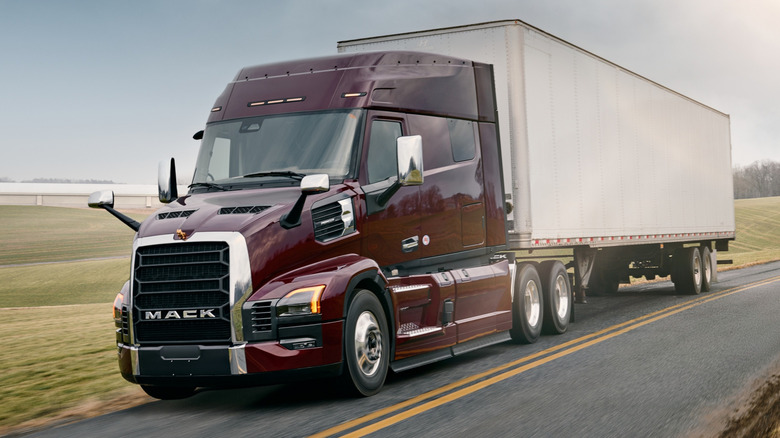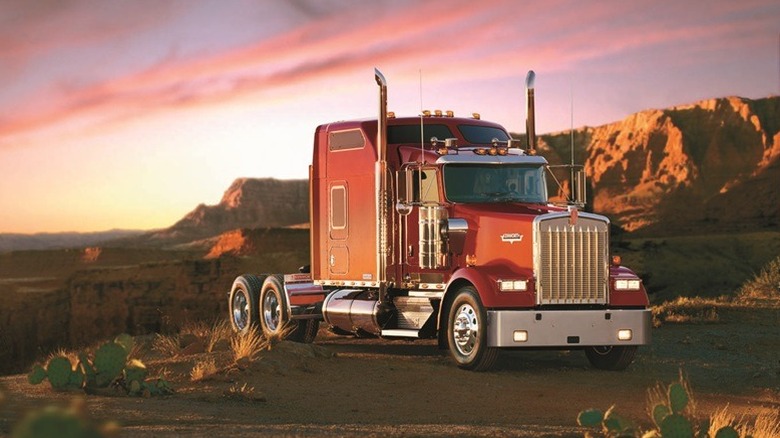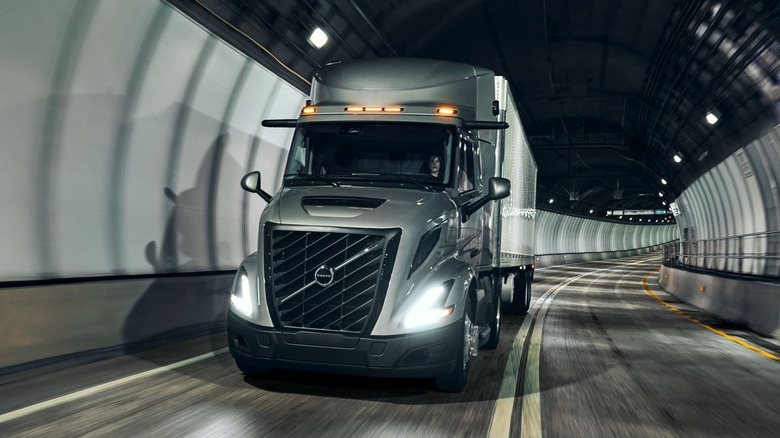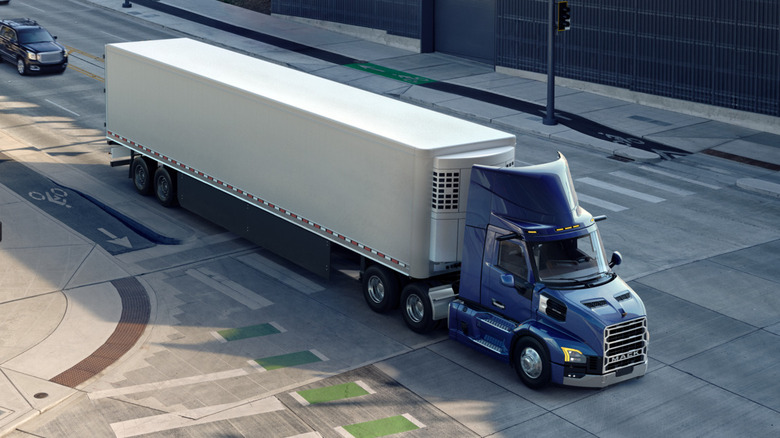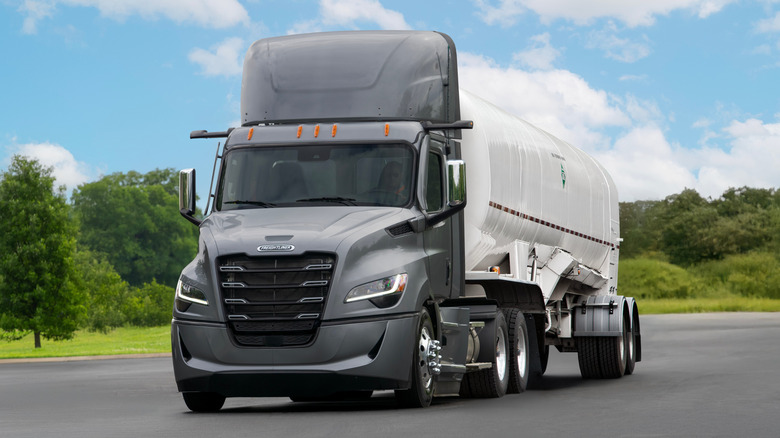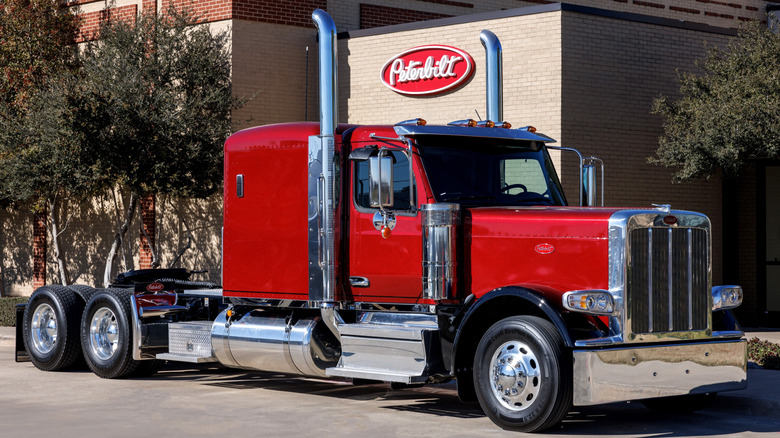5 Semi-Truck Brands That Are Made In America
There are currently just under 3 million semi trucks registered on U.S. roads, and they're responsible for shipping vast amounts of cargo to every corner of the country. They play a key part in keeping America's economy running, and fittingly, many of them are also made in America. Exactly where these trucks are built varies between manufacturers, with some brands building their entire lineups in one single facility and others spreading their manufacturing network out across multiple states.
Many of America's biggest names in trucking are homegrown brands, but even some brands that originated overseas have moved their production facilities to America over time. With U.S. trucking regulations — and U.S. trucks as a whole — being very different to those found across Europe and Asia, it doesn't make sense for most manufacturers to attempt to build global-market models in the same way that many carmakers do. These five leading truck brands all offer semi trucks that are designed for American drivers and American roads, and all of them are manufactured in America too.
Kenworth
The Kenworth brand is part of truck maker PACCAR, with both companies having been around for over a century. Its most high-tech plant is in Renton, Washington, with both its diesel and all-electric trucks built on the same production line. The Renton factory first opened in 1993 and is responsible for building a wide range of Kenworth models including the T680, W900, and T800. Alongside its Renton plant, the brand also has a second assembly plant across the country in Chillicothe, Ohio. The latter is the older of the two facilities, and celebrated its 50th anniversary in 2024.
Both Kenworth plants have been responsible for churning out huge numbers of semi trucks since they opened, with the Chillicothe plant building its 750,000th truck in 2023. While the brand's roots are in America, Kenworth also has an Australian division that makes trucks for the country's local market. Its Australian plant is in Bayswater, a suburb of Melbourne, and first opened back in 1970. That makes it older than both of Kenworth's two American plants, but its output is much smaller, having made its 70,000th truck in 2021.
Volvo
Despite sharing a name, Volvo cars and Volvo Trucks are made by separate companies. Volvo Trucks is distinct from the maker of the XC60, XC90, and S90 cars, and has its own set of manufacturing facilities both in the U.S. and elsewhere in the world. The sole Volvo Trucks plant for American-market trucks is the New River Valley Plant in Dublin, Virginia. It covers 2.3 million square feet and produces models including the VNR, VNL, and VNX. Most of its trucks leave the plant with diesel engines, but some are also electric, since the brand produces its VNR Electric at the same facility.
Volvo also operates several other facilities within the U.S., all of which play a key role in its manufacturing operations. A powertrain manufacturing facility in Hagerstown, Maryland builds engines and transmissions for various Volvo truck models, while its Remanufactured Parts Facility in Middletown, Pennsylvania is responsible for taking old parts from the brand's existing trucks and restoring them back to as-new condition.
Mack
Alongside Volvo Trucks, Mack also has a powertrain manufacturing facility in Hagerstown, Maryland. The plant produces the transmissions, engines, and other powertrain components that go into Mack's integrated powertrain. Spotting a Mack truck with an integrated powertrain is easy — just look for trucks with a golden bulldog mascot on the hood. While the company's powertrains are built in Maryland, the assembly of the trucks themselves takes place at the Lehigh Valley Operations (LVO) plant in Macungie, Pennsylvania.
LVO has been in operation since 1975 and produces both the brand's diesel truck range and its LR electric truck. As well as producing every North American-market Mack truck, it also builds trucks for export markets. The facility is huge, covering 1.7 million square feet, but it isn't Mack's official headquarters. Instead, the brand is headquartered in Greensboro, North Carolina, which is where both the brand's development teams and sales teams are based, as well as its executives.
Freightliner
America's most popular semi truck brand by sales is Freightliner, which is part of Daimler Trucks, alongside its sister brand Western Star. Its trucks are built in multiple locations across the U.S., including at the Cleveland Truck Manufacturing Plant in North Carolina. The Cleveland plant is Freightliner's largest, and it builds models including the Cascadia. It's available both with a traditional engine and with a natural gas powerplant. The same facility also produces Western Star trucks.
Daimler Trucks also owns a separate facility, the Portland Truck Manufacturing Plant in Oregon, where it builds a range of Western Star models and Freightliner's electric medium-duty truck, the eM2. Its gas-powered medium-duty models are built in the Mount Holly Truck Manufacturing Plant, in North Carolina. The Oregon facility is already an important part of the brand's manufacturing network, but it's set to take on a new role soon. The brand announced in 2024 that it would invest $40 million in a new low-emissions powerplant development facility at the site.
Peterbilt
Another of the largest truck brands in America, Peterbilt is owned by PACCAR, which also counts Kenworth among its roster of brands. Its trucks are made in a plant in Denton, Texas. The facility hit the milestone of building its 750,000th truck in 2023, the same year that Kenworth's Chillicothe, Ohio, plant celebrated the same feat. Peterbilt's Denton assembly line has been in operation since 1980. The brand itself is much older, with the brand's first truck assembled in 1939.
The brand was initially independent, but became part of PACCAR in 1958. Since then, it has expanded into making medium-duty trucks as well as continuing to build on its lineup of on-highway semi trucks. Today, the brand makes two conventional on-highway models, the Model 579 and Model 589, as well as an all-electric semi truck, the Model 579EV. Alongside its U.S. facility, Peterbilt also operates a plant in Quebec, Canada, although it announced in July 2025 that it was planning to lay off some staff at the plant in the face of weak demand.
